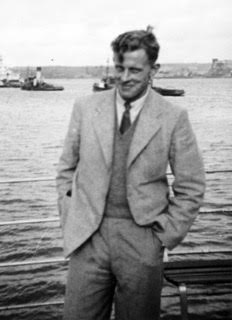A Reg Varney story you won't know
Young Reg Varney - a musician before he became an actor, and an artist, and a writer!
The fascinating story of Reg Varney’s life – from East End
to West End, and then from TV stardom to a quiet retirement in Budleigh
Salterton – is only partly told in his autobiography The Little Clown.
The book
was supposed to have a sequel, but somehow that never happened, and the reader
is left just as the star of The Rag Trade and On the Buses is called up to
serve in World War Two.
So I find myself absorbed in completing the story of his
life for visitors to Fairlynch Museum’s 2016 exhibition. It will be called Our
Little Clown and will be published in the New Year.
Like many other well known names from the world of
entertainment – Peter Sellers, Harry Secombe, Spike Milligan and Benny Hill –
to name just a few, Reg Varney honed his skills as a comedian by entertaining
the troops.
A young Benny in 1947. He looks quite nice after all
For a time in the post-war period, Benny Hill was his comedy partner but was clearly ill at ease with live theatre. That was cruelly demonstrated with a disastrous episode at the Sunderland Empire Theatre in 1951 when Hill was slow handclapped off stage. ‘I could have cried for him,’ Varney said.
Hill is generally thought to have been more far-sighted
than most entertainers of his generation in spotting the potential of
television, in which he was highly successful.
Reg’s letter may not have gained him an audition but it was kept by the BBC
Varney mentioned in his letter to the BBC that he had played with the Jan Ralfini band, one of the top bands of the 1930s, but that 'owing to expences it did not pay me.'
Varney explained that his act was ‘songs at piano & songs at
accordian — also hot syncopated selection of Tiger Rag.’ He mentioned also in his letter that he worked ‘cinamars’, but that, he boldly stated, ‘is not big
enough for me.’
For a boy who’d left
school four years earlier, it’s a remarkably cocky and confident piece of
writing. It’s interesting to consider
whether the stuffy BBC clerk who received it would have passed the letter to
his superiors had it not been for those misspellings and grammatical errors.







Comments
Post a Comment